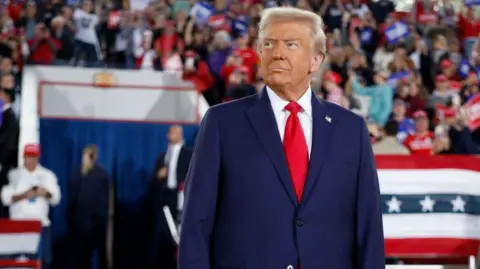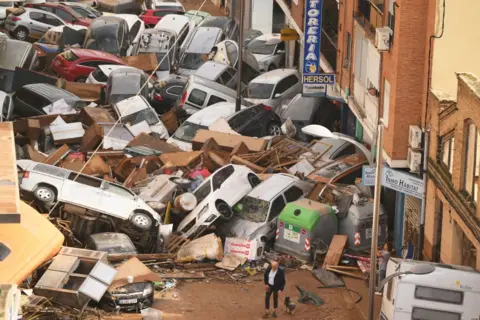US envoy vows climate fight will continue under Trump

 Getty
GettyThe US will still continue fighting climate change and curbing its emissions of planet-warming gases despite the election of Donald Trump, the US special envoy told the COP29 conference on its opening day.
John Podesta, a Biden administration appointee, labelled the incoming president a climate denier who would dismantle environmental safeguards and remove the US from a key international agreement to stop burning fossil fuels.
Experts say Trump’s return to the White House will have a hugely negative effect on climate change action, at least in the short term.
But Podesta said “facts were still facts, science is still science,” and US states and cities would continue the fight to reduce fossil fuel use.
“In January we are going to inaugurate a president whose relationship with climate change is captured by the words ‘hoax’ and ‘fossil fuels’, Mr Podesta said.
“He has vowed to dismantle our environmental safeguards and once again withdraw the United States from the Paris Agreement.”
“That is what he has said, and we should believe him.”
The 2015 Paris agreement saw countries agree to try to keep global temperature rise below 1.5C.
Leaders from nearly 100 countries will address the meeting in the coming days.
COP29 had been billed as an opportunity to solve the crucial issue of getting money to poorer countries to help them deal with the impacts of climate change and help them prepare for it.
But expectations for what the summit can achieve have been lowered by a Trump victory that makes Biden administration negotiators from one of the world’s largest carbon emitters a lame duck in this process and unable to really promise much.
However, the election wasn’t the end of the struggle, Mr Podesta told reporters.
He believed that as a result of the policies put in place by President Biden and with the support of states and cities, US emissions would continue their downward trajectory, albeit at a slower pace.
“The fight is bigger than one election, one political cycle and one country. This fight is bigger still because we are living through a year defined by the climate crisis in every country of the world.”
COP29 got underway amid a welter of scientific gloom. The UN’s World Meteorological Organization (WMO) said in a report released to coincide with the conference’s start, that 2024 is on track to be the world’s warmest year on record.
Its latest State of the Climate report also finds that our oceans are heating up rapidly and glacier melt is accelerating.
“We are on the road to ruin,” Mukhtar Babyaev, president of COP29 said in his opening remarks.
He went on to list examples of climate impacts now around the world, saying “these are not future problems” as rising temperatures were doing huge damage around the world right now.
 Getty Images
Getty ImagesThe mood of delegates wasn’t improved by the scale of the main task facing negotiators here.
Amid energy and economic crises, developed countries are expected to find billions extra in climate finance for developing nations.
Richer countries are willing to increase their contributions, as long as major emerging economies like China and the Gulf states also chip in.
UN climate change chief Simon Stiell said that two thirds of the world cannot afford to cut emissions quickly enough to keep the 1.5C temperature threshold alive.
If they didn’t get the cash to cut their carbon, everyone suffers, he said.
“Let’s dispense with any idea that climate finance is charity. An ambitious new climate finance goal is entirely in the self-interest of every nation, including the largest and wealthiest,” he told delegates.
One issue exercising the minds and pockets of attendees at this gathering is the price of food and drink in the conference centre
Our colleague Aygul Mehman, a journalist with the BBC’s Azerbaijani service, was charged 41 AZN (the Azerbaijani currency) for her modest lunch of soup, a bean salad and a dry roll. That’s about £18 ($24).
“It’s like they are taking money from our pockets,” one delegate told BBC Climate Editor Justin Rowlatt as he was queuing up for food.
This is a serious issue. Delegates from poorer nations often complain about how much these big conferences cost them when you add in flights and hotels and the total can come to many thousands of pounds.





